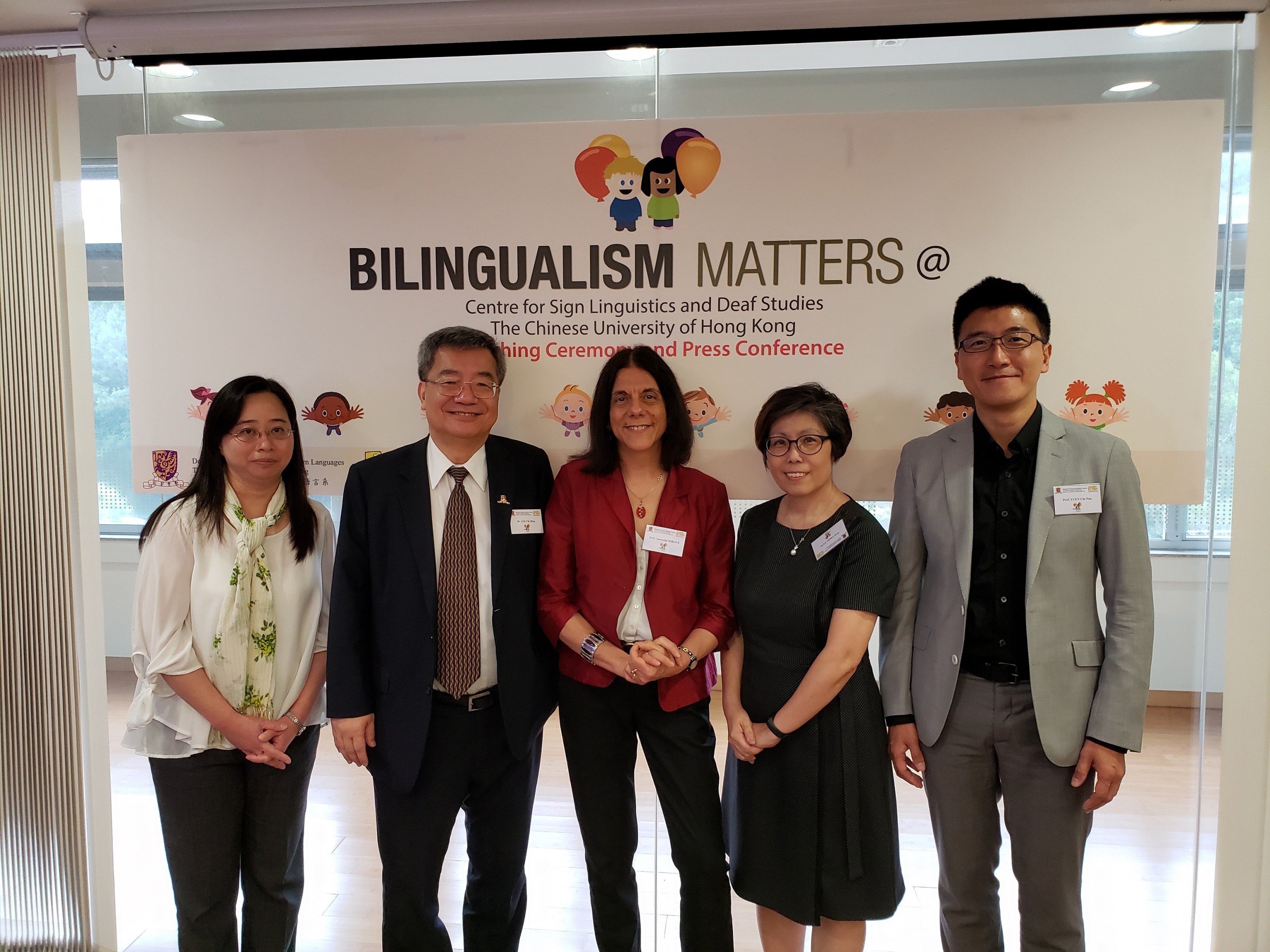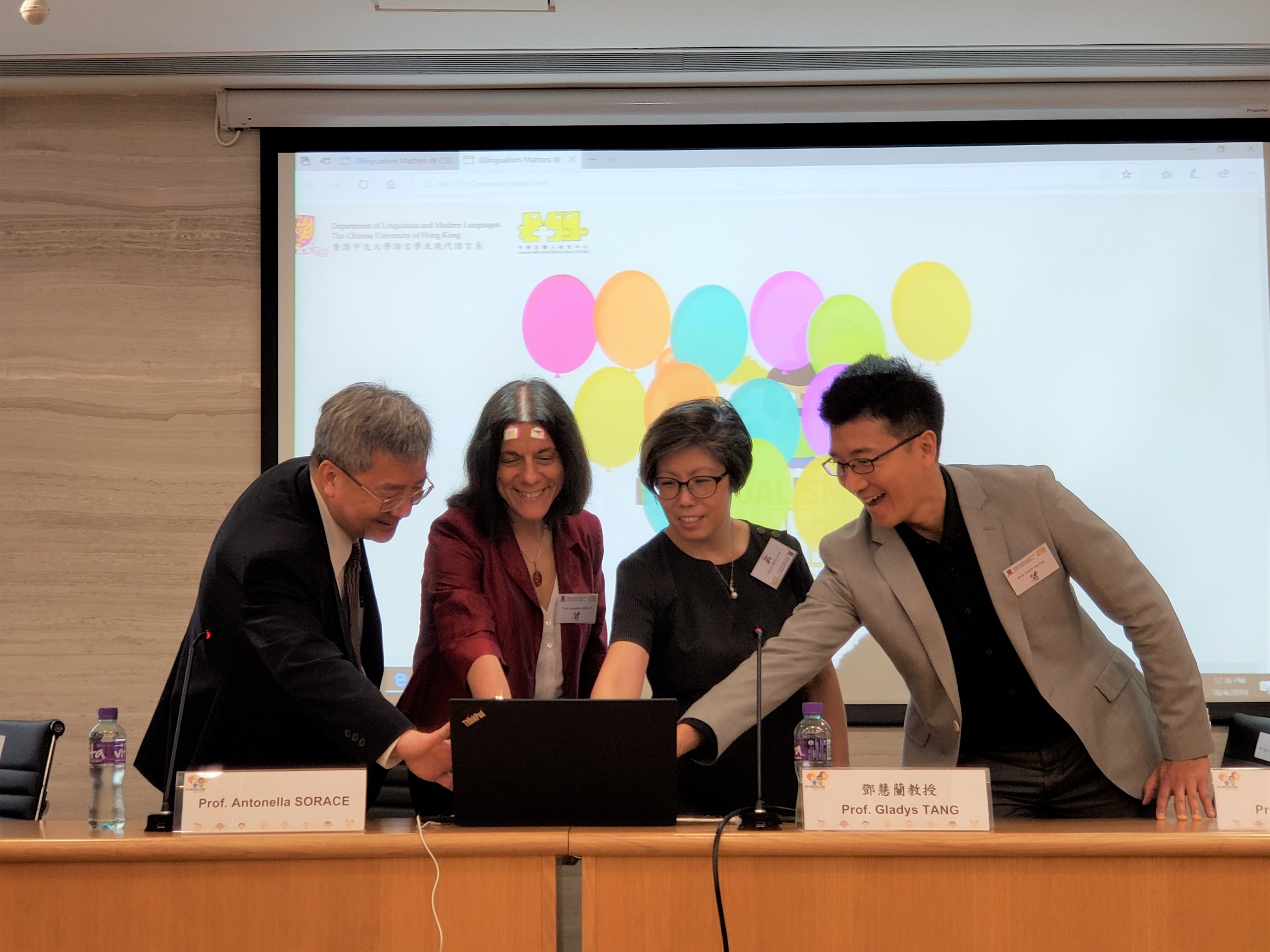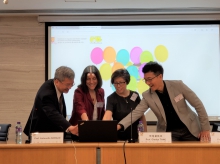CUHK
News Centre
CUHK and University of Edinburgh Establish Bilingualism Matters’ First Asia Branch For the Advancement of Bimodal and Bilingual Learning Environment
The Centre for Sign Linguistics and Deaf Studies (CSLDS) of The Chinese University of Hong Kong (CUHK) and Bilingualism Matters of The University of Edinburgh have set up the first Asia Branch of Bilingualism Matters at CUHK. The inauguration ceremony was held today (18 April). Bilingualism Matters is a network of 25 higher institutions across Europe and the US, promoting bilingualism education and the study of its effect on speech and cognitive development. CUHK is the first Asian member and CSLDS will become the core team to lead the study and promotion of bimodal bilingual education and research.
Bringing sign language into the scope of research and community outreach projects of Bilingualism Matters is a milestone in building an inclusive world for the deaf and the hearing. The Fun with Sign and Speech (FS2) will be the first project to demonstrate how early exposure to two languages, especially those stemming from two different modalities, benefits child speech and cognitive development.
Prof. Antonella Sorace, Professor of Developmental Linguistics from the School of Philosophy, Psychology and Language Sciences of The University of Edinburgh, has been studying the positive effects of bilingual language acquisition during childhood. She established Bilingualism Matters in 2008 because of the insufficient second language learning opportunities for children in the Western World, especially the Anglosphere. She strives to translate empirical research findings of bilingualism into information that is accessible to parents, teachers, businesses, policy makers and clinicians in order that they can make informed decisions on matters involving bilingualism. Her efforts have contributed to the implementation of the 1+2 Approach, which is a new Scottish education policy that offers children the opportunity to learn additional languages from primary one onwards.
Bilingualism Matters and CSLDS share a similar conviction that bilingualism, be it in spoken languages alone or spoken language and signed language (bimodal bilingualism) together, is advantageous to a child’s development. Established in 2003, CSLDS has a mission to propagate the benefits of being bilingual in a spoken language and a signed language. Equipped with empirical findings from sign language research and, in recent years the study of bimodal bilingual acquisition, CSLDS has become a pioneer in Hong Kong and Asia of sign language education and research. Collaboration between CSLDS and Bilingualism Matters aims to enable societies to embrace linguistic differences arising from bilingualism and multilingualism, such as dialectal differences in languages and the languages of ethnic minorities, especially Deaf minorities. The timely establishment of a branch of Bilingualism Matters at the CSLDS will spearhead this translational process in societies in Hong Kong, Greater China, and Asia. Incorporating sign language for the first time into Bilingualism Matters highlights the new discovery that bilingualism straddles different modalities, visual or auditory.
Prof. Antonella Sorace stated, “Early exposure to two languages, including those stemming from two different modalities, benefits child development. This will dispel the misconceptions that sign language would only impede the spoken language development of young children, especially deaf children. The joint research effort in FS2 will underpin outreach programmes in the UK and elsewhere, directly feed policies on sign language education, and provide the bases for outreach campaigns and activities in the 13 countries where Bilingualism Matters branches are located.”
Prof. Gladys Tang stated, “FS2 provides an excellent platform for Bilingualism Matters and CSLDS to develop a combined community outreach and research model to promote and examine the effects of early bimodal bilingualism on child development. FS2 is organised by SLCO Community Resources (SLCO-CR) and has already benefitted 72 deaf and 91 hearing infants and their parents and led to positive outcomes.”
SLCO-CR is a spin-off non-profit organisation of CSLDS. The funding to run FS2 programme comes from the Social Innovation and Entrepreneurship Development Fund (SIE fund). In 2017, it received the Asia for Good Reader’s Choice Award from the Social Venture Challenge Asia, out of 1,080 entries from 31 countries.
(From left) Prof. Felix Sze, Co-director of CSLDS and Associate Professor of the Department of Linguistics and Modern Languages, CUHK; Dr. Chi-ming Lee, Director, Office of Research and Knowledge Transfer Services, CUHK; Prof. Antonella Sorace, Professor of Developmental Linguistics and Director of the Centre Bilingualism Matters, University of Edinburgh; Prof. Gladys Tang, Director of CSLDS and Professor of the Department of Linguistics and Modern Languages, CUHK; Prof. Chi Pun Yuen, Associate Professor of the Department of Special Education and Counselling at The Education University of Hong Kong.





